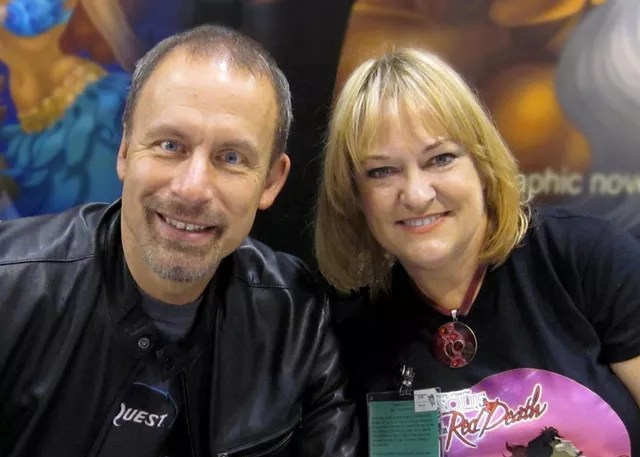
Richard and Wendy Pini

Audio By Carbonatix
Richard and Wendy Pini have been living with elves for more than forty years. That suits them just fine: They’ve made a career out of it, with their creator-owned independent comic Elfquest, which debuted in 1978 and has continued in some format ever since. The book just wrapped a major storyline, capping an impressively long run by finishing not the series, but the story of one of its main characters.
Fans nationwide have embraced Elfquest – and its creators – for decades. And now Colorado fans will get a chance to thank Richard and Wendy Pini in person, at the upcoming DiNK Indie Comics and Art Expo set for April 13-14 at the McNichols Building, where they’re two of the most special of special guests.
In advance of their Denver appearance, we talked with Richard Pini about how he and Wendy have breathed life into elven clay over the past forty years, thrilling lovers of comics and fantasy.
Westword: You’re one of the special guests at DiNK this year; what do you have planned for fans? What are you most looking forward to at the convention?
Richard Pini: We’re most looking forward to what feels like a unique vibe coming from the very idea of what DiNK is. It’s not a huge sprawling thing like Comic-Con in San Diego or New York, it’s not so narrowly focused as a small press expo…to be honest, from reading the promos and website, it’s not like any show we’ve attended before. We do love Denver, as we’ve been there a few times, so the combination of location and variety of events offered at DiNK is really attractive to us. What we have planned for fans is our usual witty and charming and surprising selves!
Since you’ve been to Denver before, what’s the thing you’re most looking forward to? Any favorite haunts when you visit? Anyplace you’ve been meaning to check out?
To be honest, we don’t expect to have a lot of free time outside of the show. If we do, we’ll very likely want to swing around to the Mile High Comics megastore, where we held a very nice signing last year for Free Comic Book Day. Alas, we don’t know the area all that well enough to have favorite haunts (yet), but we’ll take advantage of whatever free time DiNK allots us.
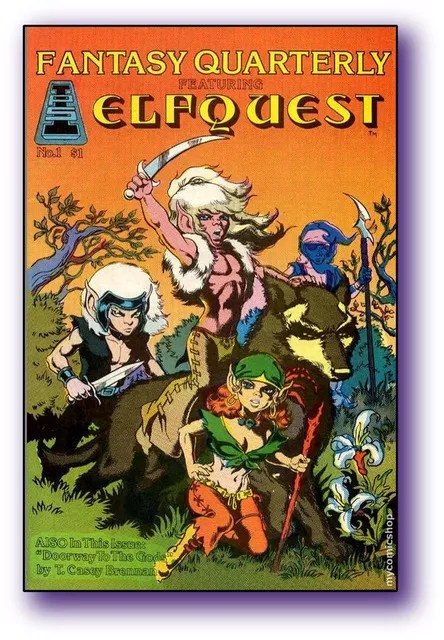
The beginning of Elfquest from 1978.
Richard Pini
Elfquest just celebrated its fortieth anniversary by bringing a major storyline to a long-coming close; can you talk a little bit about how the idea started back in the late ’70s? That was a fantasy-rich environment back then, and the audience was only growing. What were the inspirations from which you were drawing?
The idea for such an epic tale has been cooking in Wendy’s psyche almost since she was born. She’s been telling stories of “other” kinds of beings searching for family and tribe and safety since well before Elfquest came up as an idea. When Star Wars made it clear to the world at large in 1977 that fantasy and science fiction and all that kind of “weird nerd stuff” was actually pretty good and acceptable within pop culture, she sat me down and said, “I have this idea…” – and the rest is history.
The Star Wars connection is cool; what direct connections do you see between that 1977 sci-fi juggernaut and the world of Elfquest? Were they conscious or sub-conscious?
I don’t know that there are any direct connections. Suddenly all over the world it was okay to like and indulge in that kind of entertainment fare, and we realized that some kind of audience might be receptive to this crazy little comic book that might not have been before. Of course, there’s the whole mythic element to both works – George Lucas and Wendy both drew upon strong archetypes to tell their tales, but for Wendy, that’s nothing new. She’d been doing that for a long time before Star Wars hit.
So how did the story grow over the years? What was the moment when you and Wendy thought,”Hey, this is actually a thing,” and it became the guiding star for your careers in the industry?
The storyline we pretty well knew from the beginning. You have to know how your story starts and how it ends for it to be any kind of honest and successful. But if you know the start and end points, you can take side trips along the way if something interesting suggests itself, if a character develops in an unexpected way. We knew twenty or more years before the story wrapped up exactly how that was going to happen, and it was torture sometimes having to keep the secret. When Elfquest started, we had no idea if it would be successful; we just didn’t want to lose money on it. Once we got to about issue number five or six, sales were good enough that we were able to make it our vocation. Until then, I was working a very nice day job at IBM, so we had that cushion. But once Elfquest took off, I realized I had to choose one or the other, and the elves won.
In a war between IBM and elves, I’d like to think that elves would win. What did you do for IBM? That must have been a massive shift, going from an office job to running your own comic-book company.
I worked at “Big Blue” for two years in their Large Systems Test area. It was my task to take the massive software used by banks or airlines or other huge concerns and try to break it before some clerk accidentally hit upon the random sequence of keystrokes that might – completely by surprise – take down the entire U.S. financial system. It was puzzle-solving on a grand scale, and I enjoyed it a lot.
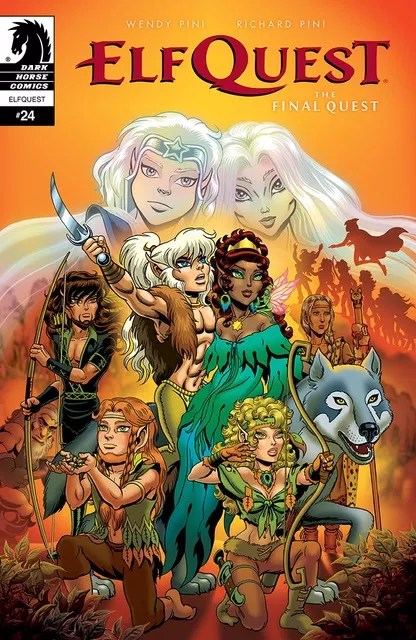
The last issue of Elfquest’s “Final Quest” storyline from 2018
Dark Horse Comics
So who’s your favorite character from the book? Do you and Wendy have different favorites?
We don’t have favorites any more than we think parents have favorites among their children. But Skywise is the most direct expression of my personality, and Cutter is the most direct expression of Wendy’s. Most people automatically assume a simplistic gender assignment: I’m Cutter and she’s Leetah. But she’s the “chief” and I’m her “advisor” in this metaphor.
What about the social commentary that’s always been a hallmark of the book? How did you both decide to include certain issues in the ongoing storyline, and what’s been the reaction from fans?
We’ve always said that Elfquest is not about this Earth, but Earth as we’d like it to be. The springboards for the story have always come from our own experiences of life, from the problems that we’ve faced – as a couple, as individuals and as part of a larger society. Everyone at some point in their life has felt alienated, left out, “other,” just as the Wolfriders have. We’ve always simply tried to tell truths about life and living and treating each other as well as possible. We’ve just dressed those truths up in fantasy garb. And the fans love it, because these are honest expressions that come from our lives, and the fans can identify.
Back in the mid-’80s, WaRP Graphics was expanding a bit, including one of my personal favorites: Phil Foglio’s short MythAdventures series. It somehow worked with Elfquest, at least for me – I remember reading them at a friend’s house one rainy Saturday. His older brother had them all, both series up to that point, and we sat around and ate Taco Bell and marveled at the comics and the art and the story. One of my fond comic-book memories. But the difference between that and the business side of things must have been remarkable. How do you remember that era of WaRP?
It was a period of experimentation, of trial and error. The original Elfquest arc concluded in 1984, and Wendy needed some time off to attend to some personal health issues; she needed a hip replacement even though she was still young. So I was a publisher without anything to publish. I’d met Robert Asprin (author of the MythAdventure prose novels), and he suggested adapting those stories into comics. It was a lot of fun, and well received. Over the next few years, WaRP Graphics published a number of non-Elfquest titles, though all were either fantasy or science fiction-oriented. As I said, it was trial and error, and after some ups and downs, I came to the conclusion that I’d rather work within the universe that Wendy and I had created than try to corral a half-dozen very different titles and concepts.
That same era was also when Marvel licensed Elfquest, which put it on spinner racks and newsstands all over the country for the first time. How did that change things for the book, and for you as the creative team?
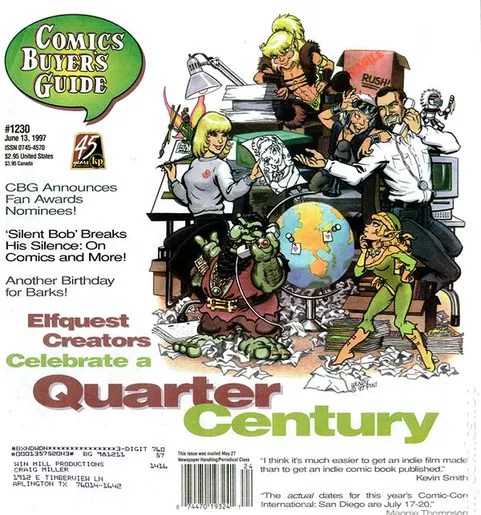
Comics Buyers Guide
Before we began publishing Elfquest in 1978, we had approached both Marvel and DC Comics to publish the story, but they both said it was too odd for them. So it was a very delicious bit of irony when, as the original Quest was wrapping up in 1984, Marvel came calling and asked if they could license the material for their new Epic line of creator-owned comics. (We never sold the rights, as some people mistakenly think. We have only ever licensed them.) It didn’t change anything of the story, as it was a purely reprint license, but the great thing was that it put Elfquest onto those newsstands and supermarket comics spinners you mention, and boosted our circulation – and thus our exposure.
Speaking of greater exposure, at several points in the run there have been rumors of film adaptations. What happened to all those dreams, and is there hope for an Elfquest movie or TV series in the near future?
Elfquest has been to the Hollywood altar at least half a dozen times since about 1981, and it’s been jilted each time. The reason, we’ve come to realize, is that Elfquest is just too complicated, and a lot of simplistic producers – or whatever – simply don’t “get it.” They want Elfquest to be Lord of the Rings lite, good guys and bad guys. And that’s just not what this complex story is. We have, in recent months, begun talking with various people about the possibility of adapting Elfquest into a long-form serial, along the lines of Game of Thrones. This would present so much more opportunity to allow the story to breathe, to develop at a sensible pace. Trying to stuff forty years of story into a two- or even three-hour movie would be insane.
A Game of Thrones-type treatment would be great, considering the scope of Elfquest and the interests of not oversimplifying the storyline. Do you see that as being produced in the same way – that is, mainly live-action with some CGI? Or would it end up being more the latter than the former? Or does Elfquest just plain belong in the realm of animation?
Over the years, we’ve been flexible enough to entertain whatever production notions a good studio might present to us. In the very beginning, 2-D cel animation was about all there was, and we dreamed of a luxurious movie on the scale of Disney’s Sleeping Beauty. As CGI has progressed, we’ve been willing to look at it. Avatar demonstrated that CGI could convincingly capture subtle facial expression, for example, and that would have been crucial to Elfquest. With a GoT-style approach, we’re happy to consider a mix of live action and CGI.
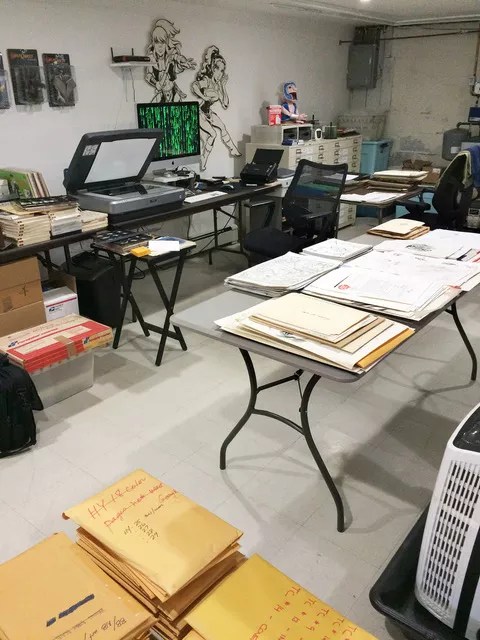
Richard’s office, where some of the Elfquest magic happens.
Richard Pini
Have you both talked about dream casting for the major characters?
We haven’t gotten to that stage yet, even in a wish-dream kind of way. But we think it would be important to cast relative unknowns so that the audience doesn’t get jolted back to reality by thinking, “Oh, there’s Zoe Saldana playing another exotic character” or some such.
And the world of Elfquest will continue. Any hints at what direction that might take?
Without going into detail – because we can’t – we’ll just say that even though a major character’s arc was completed in the most recent series, “Final Quest,” there are still other very important characters whose tales need telling. Plus, we know that some characters live well beyond the timeline of the just-concluded epic, as evidenced by what we call the “FutureQuest” stories that take place hundreds of years later on, in a world that has advanced into an age of technology.
So what’s it like to be able to look back at forty years of the same world, the same characters, the ongoing saga, and realize that you’ve come to an end?
Well, it hasn’t really come to an end, not in the absolute sense. But, yes, we did finish a forty-year masterwork, and we were able to do it just the way we wanted, the way we set out to do it. And there are feelings of relief mixed with feelings of “What do we do now?” There’s also a great sense of accomplishment and much gratitude. The one emotion that we don’t feel is sadness. And the “what’s next” feelings are quickly giving way to the work that we know we’re going to be doing in the months ahead.
The Denver Independent Comics & Art Expo will be at the McNichols Building April 13-14. Get the full schedule at the DiNK website.